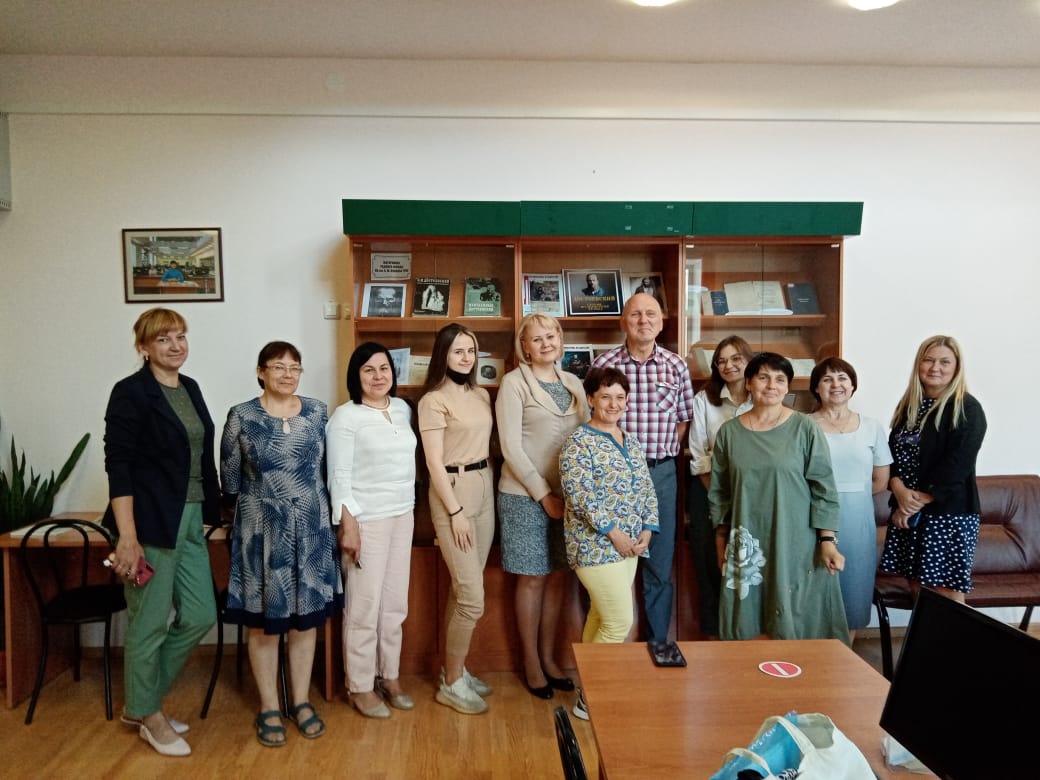THE USA TEACHER ON THE AMERICAN EDUCATION SYSTEM

On July 16, in the reading room of the Science Library of the Tomsk State Pedagogical University, Oleg Voskresensky, philologist, master of theology, PhD in pedagogy, co-author of textbooks "Fundamentals of Orthodox culture" and "Fundamentals of World Religious Cultures", teacher of master courses of Belgorod Orthodox Theological Seminary, altar server of the Russian Orthodox Church of the Resurrection in Fridley, Minnesota, USA, delivered an open lecture on "Basics of Christian Pedagogy".
The meeting was held as part of the activities of the International Scientific and Practical Center for Axiology and Methodology of Spiritual and Moral Formation at the TSPU:
"The Center tries to build international connections as much as possible in order to study and analyze the experience of other specialists in the field of education and upbringing. It is very important that this lecture was given at our university because the attendants were also able to get acquainted with the American system of education and the role of the teacher in it. We hope for long-term cooperation and plan to continue our collaboration in different formats", — said Anastasia Koshechko, Director of the Centre.
At the beginning of the lecture, the speaker emphasized the role of the teacher not only in the Christian tradition but also in the education system as a whole:
"Teaching is the most blessed profession in the world. Each of us chooses a trade because of some factors and conditions. One way or another, we are limited in our choices. And God - the one who was not limited in this at all - gave preference to teaching."
With reference to the Commandments, the lecturer explained how the Christian tradition is linked to the most important principles of teaching: to teach everyone with no exceptions, to enlighten students, to devote oneself completely to teaching, to be an example to one's students.
The most important principle of the Christian tradition is legitimacy because the world is built according to the law. As the American expert noted, in today's world there is no respect for the law, which is perceived only as a restriction, which leads to violence. Equally important is the principle of unity in multiplicity. It is realized in the diversity of people and their difference from one another, in the uniqueness of each individual and in the ability to accept those characteristics in one's neighbor.
In order to reveal the divine intention in a child, a great deal of effort and time is required on the part of the educator. In this is expressed the principle of immortality of the soul. Otherwise, human existence loses its former meaning. One of the main tasks of an educator, according to the lecturer, is to discover the child's vocation. At the same time, the latter is absolutely free in his choice and therefore has the right both to make a mistake and to try again.
The art of dissent, as another important principle of the Christian tradition, begins with the recognition that it is possible to dissent. Denial instantly shuts down all channels of communication between people. In turn, positive thinking makes it possible to find that very agreement, not to stop at compromise, because it is always a solution that is equally unsatisfactory to all. The rejection of any compromise as a constraint on our resources leads people to an agreement that comes from their boundlessness.
The presumption of kindness proceeds from the assumption that everyone is honest, innocent, unselfish, and friendly by default until they have proven otherwise.
According to Oleg Vladislavovich, teachers have been given a very high bar, a model that at first glance is unattainable. At the same time, there is the experience of teachers who have achieved some success in implementing the principles discussed in the lecture. Today's generation of teachers is gradually abandoning attitudes that are alien to the teaching profession and returning to more timeless and universal ones:
"In today's young generation I see mainly the realization of two important principles - positive thinking and the presumption of kindness. Today's young people are looking for something to lean on, abandoning inhibitions, being on the lookout for the positive. I can see that an attitude of respect for the human being and love for one's neighbor prevails in young people".
The audience, which included students, faculty, and staff, also discussed the unique nature of the American and Russian educational systems and found some differences between them. Oleg Vladislavovich pointed out, based on his personal experience, that Russian students are a year and a half to two years ahead of their American peers, because Russian education is primarily knowledge-based, while American education is aimed at developing practical skills.
The status of the teacher in American pedagogy is also different from the status of the teacher in the Russian tradition. The U.S. is a territorial amalgamation of different individual states, so there is no universal model that works across America. There are also no model manuals because every teacher creates a unique experience in his or her class.
You can become a teacher in the states by taking special courses and modules that allow you to teach your specialty in school, but you don't need to do it to teach at university. Before going to teach children in school, a specialist gains experience in his or her specialty in the "field".
The meeting with the interesting speaker showed the students from the TSPU features of Christian pedagogical tradition and the peculiarity of the American educational system, which allowed them to find trends prevailing in the development of modern teaching.